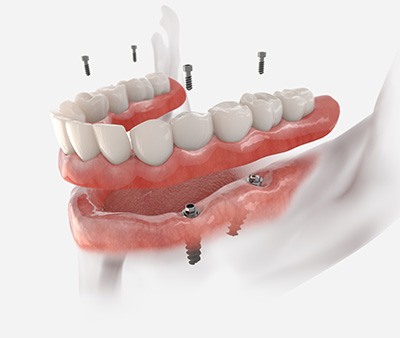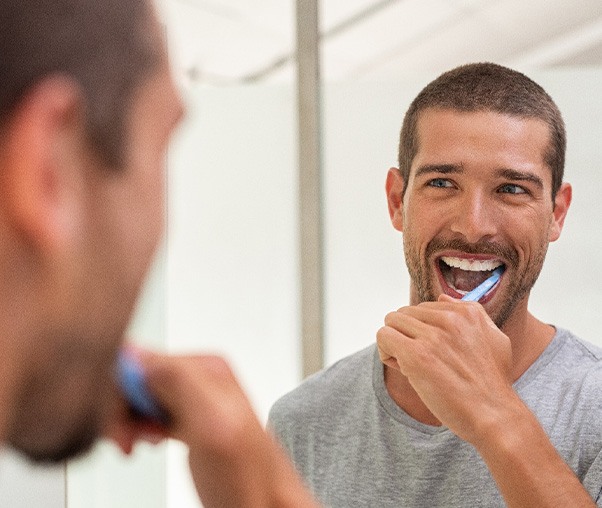Dental Implants – Carrollton, TX
The Modern Solution for Gaps in Your Smile
At some point in your life, you may end up with one or more missing teeth and will need to figure out the best way to fill in the empty space in your smile. As far as modern dentistry is concerned, your best bet in most cases will be dental implants. Instead of just replacing the part of the tooth that sticks out above the gums, implants allow us to replace the underlying roots as well, resulting in the strongest, most stable smile possible. Call Rosemeade Dental today to schedule a consultation to discuss dental implants with our Carrollton, TX dentist, Dr. Suggala.
Why Choose Rosemeade Dental for Dental Implants?
- Offering Placement & Restoration
- State-of-the-Art Dental Techniques
- Quality Materials for Restorations
What is a
Dental Implant?

A dental implant isn’t a tooth replacement by itself in the same way that a crown or bridge is. It’s a thin metal post that can be surgically inserted into the jaw, where it can fuse with the bone through a process called osseointegration. Once implants are fully in place, they can support crowns, bridges, and even full dentures to fill gaps of any size in your smile. In other words, a dental implant is essentially a new root for any number of replacement teeth.
The 4-Step Dental Implant Process

The dental implant process is divided into several steps. After the necessary preparations are made, the implants are placed in your mouth, and your new teeth will be placed on them at a later date once you’ve completely healed. Thanks to her implant expertise, Dr. Suggala can complete every phase of the implant process right here under a single roof; you’ll have a dentist you already know and trust helping you every step of the way.
Initial Dental Implant Consultation

Unlike many other dental offices that claim to provide dental implants, the Rosemeade Dental team can complete the entire procedure in our Carrollton dental office. This means from your initial consultation to your placement surgery to when we attach your new teeth, you’ll work with the same professionals that you trust the entire time. During your initial visit, our team will thoroughly assess your oral health and situation to determine if dental implants are right for you. We’ll also need to verify that you are free of any complications that could risk treatment failure later on, such as gingivitis and insufficient jawbone density. After we’ve performed any necessary preliminary services, like bone grafting, gum disease treatment, or tooth extractions, we can move forward with the surgical stage.
Dental Implant Surgery

To begin your dental implant surgery, your dentist will first administer local anesthesia to ensure that you are completely pain-free throughout your procedure. For further comfort and relaxation, we can even provide sedation dentistry so that you can have a more pleasant experience. Once you’re prepared, your dentist will create a tiny incision in your gums so that they can reach the jawbone and place your dental implant(s). Afterward, they’ll suture your tissues closed around the posts and top it off with a protective cap. This way you can keep the implant safe during recovery.
Dental Implant Osseointegration & Abutment

After your surgery, we’ll have your trusted family member or friend take you home so that you can get plenty of sleep. Over the next three to six months, you’ll need to take proper care of your mouth because of osseointegration. This is the process in which your implant will fuse to your jawbone, effectively creating the new tooth roots necessary to support your new teeth indefinitely. Once this is completed, you’ll come back to our office to receive your abutments—metal pieces that will connect your restoration to your implant.
Delivery of Dental Implant Restoration(s)

You’ll need to take some time for your gums to heal from getting your abutments. After you’ve fully recovered, you’ll return to have your new dental crown, bridge, or denture attached to your implant(s). We will double-check that your bite is perfect and verify that you’re happy with your treatment before sending you on your way to enjoy the amazing results.
Benefits of Dental Implants

As the modern solution for gaps in your smile, dental implants offer a wide array of benefits that you simply can’t get with traditional options like dentures or a dental bridge. Since they’re designed to replace the entire structure of a missing tooth, dental implants look, feel, and function just like your natural pearly whites! There is a long list of reasons why dental implants are considered the gold standard of tooth replacement by both dentists and patients. Read on to learn about some of them!
Day-to-Day Benefits

- Improved Appearance: New teeth will obviously solve the issue of having noticeable gaps in your grin. The restorations for your implants will be carefully designed to blend in so well that they’re indistinguishable from your natural teeth.
- Improved Diet: Since your new teeth will be anchored into your jawbone, they will have chewing power that’s almost on par with your natural teeth. You won’t have any troubles eating any of your favorite foods.
- Improved Comfort: Dental implants don’t rest on your gums or alter your healthy teeth like dentures and dental bridges do. Not only does this provide your smile more stability, but it also won’t cause any gum irritation or tooth sensitivity.
- Improved Confidence: With their reliable and steadfast foundation in your jawbone, you’ll never have to worry about your dental implants feeling loose or slipping out of place at embarrassing times. You’ll be able to smile, talk, and laugh confidently once again!
Health Benefits

- Prevent Jawbone Deterioration: Getting dental implants doesn’t just fill in the empty space in your mouth. Your new teeth will fulfill the same functions as your natural teeth, which includes stimulating the jawbone so that it doesn’t break down. This also helps prevent the sunken, aged appearance that typically accompanies tooth loss!
- Prevent Oral Health Issues: It’s easy to keep dental implants clean and healthy with regular brushing, flossing, and rinsing with mouthwash. This makes it a lot easier to maintain optimal oral health and prevent issues like gum disease and dental infections.
- Prevent Future Health Problems: Dental implants encourage better oral health, which in turn promotes better systemic health. Those with healthy smiles are found to be at a lower risk of health problems like arthritis, malnutrition, and heart disease.
Long-Term Benefits

- Long Lasting: Most of the time, you can expect a traditional restoration like a denture or dental bridge to last around 10 to 15 years. On the other hand, a dental implant has a much longer lifespan on average; in fact, as long as you take good care of it, you can expect to keep it for the rest of your life!
- Live Longer: Completing your smile with dental implants can help you live longer. Studies show that those with 20 teeth or more at the age of 70 have a considerably higher chance of living longer than those with less than 20 teeth at that age.
- Save Time & Money: Dental implants may have a higher initial cost than dentures or dental bridges, but since they may never need to be replaced, they could easily end up being the more cost-effective solution over the years.
Who Dental Implants Can Help

Dental implants can be a great way to refurbish your smile regardless of how many teeth went missing. However, before you can proceed, you must consult with Dr. Suggala to ensure that you’re a good candidate. She will ensure that no preexisting issues might interfere with their success before she confirms that you can safely undergo the procedure.
Keep reading to learn more about who can benefit from these versatile restorations, and feel free to contact us for more information.
Who Is a Good Candidate for Dental Implants?

Although potentially any healthy adult who lost teeth can get dental implants, specific criteria must be met for you to move forward with this treatment, including:
- Dedication to oral care. Cavities and gum disease can lead to implant failure, so you’ll need a clean mouth before getting them.
- Good general condition. There’s a surgical component to getting dental implants, and your body must be able to undergo the procedure safely.
- Sufficient jawbone density. To remain in place, your implants must fuse with your jawbone. If it’s too thin, they could fail.
Missing One Tooth

If you’ve lost a single tooth, replacing it with a dental implant is relatively simple. First, a titanium rod is embedded into the socket left behind. Once that heals, we’ll provide a lifelike dental crown that looks just like your natural teeth, so no one can tell the difference.
Unlike dental bridges and dentures, this restoration is a sturdy standalone structure that doesn’t rely on its neighbors or gum tissue to remain in place. As a result, it’s easier to preserve your dental health by brushing and flossing twice daily.
Missing Multiple Teeth

For those who have two or more teeth that fell out consecutively, our team can close the gap in your grin with an implant bridge. To do so, we’ll place two implant posts on either side of the space to hold a dental bridge in place. Unlike traditional dental bridges, this method doesn’t require removing any enamel from still-viable teeth to serve as abutments.
Missing All Teeth

People who no longer have any natural remaining teeth can potentially benefit from implant dentures. This solution involves surgically placing four to six strategically placed rods into your jawbone. Then, we’ll create fully individualized dentures that will anchor to them permanently. This procedure combines the reliability and resilience of implants with the convenience of complete dentures to entirely refurbish your smile.
Understanding the Cost of Dental Implants

Before you get dental implants, you have to carefully consider the costs involved. We can give you an estimate once we figure out how many implants you need, the type of restoration they’ll support, and what kind of preparatory steps are needed during the treatment. Remember that even though the initial cost of dental implants in Carrollton is usually higher than that of other restorations, their longevity combined with the various benefits they offer make them a worthwhile investment.
Preliminary Treatments & Dental Implant Surgery

When meeting with our dental team to discuss your candidacy for treatment, it may be necessary for you to undergo one or more preliminary treatments. If so, you can expect periodontal therapy, tooth extraction, bone graft, or sinus lift to be included in the overall cost of care.
Also, your minor oral surgery that is required for implant placement will be included. Fortunately, because we are capable of placing and restoring dental implants in Carrollton, you will not be required to pay a separate fee to an outside specialist.
The Parts of Your Dental Implant

The parts of your dental implant also incur their own fees. It may not seem possible, but each intricate piece is separate. This information is factored in by looking at:
- How many dental implants you need – Requiring only one dental implant will be much less expensive than four or five that are needed for an implant denture.
- The materials used – Titanium and zirconia are most commonly used when creating the screw-like posts.
- The type of restoration you need – Based on how many teeth need to be replaced, we will determine whether you need a crown, bridge, or denture. You can expect a dental crown to be much less than a denture.
- The brand – Cheaper materials are used by some dental offices; however, at Rosemeade Dental, we believe in offering only the highest quality restorations available. This ensures greater longevity and stability – both of which are essential for dental implants.
How Dental Implants Can Save You Money

Dental implants are costlier than other tooth replacement solutions; however, when you consider their many benefits, you can understand why they’re an investment worth making. And much to your surprise, they will actually save you money in the long run. How? Here are just a few ways:
- You will not need to buy any denture adhesives or special cleaning solutions to keep your new teeth in place or clean.
- You will avoid frequent replacements and adjustments that are often required of dentures and dental bridges.
- You can minimize your risk of systemic issues that can be costly to treat and stem from tooth loss.
Does My Dental Insurance Cover Dental Implants?

When reviewing your dental insurance policy, there is a good chance you will not find any mention of coverage for dental implants. This is because many companies are still considering these prosthetics to be an “elective.” But there is a possibility that you can have some of your treatment paid for by your insurance carrier. Whether it is your initial consultation, customized restoration, or preliminary treatments, there are ways to save, and our team will work to identify them, so you can spend less on your new smile.
Making Dental Implants Affordable

To ensure that you do not empty your pockets and savings account in an attempt to receive new teeth, your implant dentist is pleased to partner with third-party financing companies like CareCredit. Enrolling in a low or no-interest payment plan will help you to spread out your cost of care and better manage your budget.
Dental Implant Post-Op Instructions

With over a decade of experience and a commitment to always sharpening her skills in restorative dentistry, Dr. Suggala is able to provide start-to-finish dental implant treatment under one convenient roof. After your surgery is complete, our team will provide you with a list of post-operative instructions to help you make a speedy recovery. If at any point you become concerned or anxious about the post-operative effects you’re experiencing, don’t hesitate to give us a call. Below, we’ve also included a brief overview of what you can expect throughout your recovery.
What to Do After Dental Implant Surgery

Just like after you have a tooth extracted, one of the most important goals following your dental implant surgery will be to protect the surgical site and blood clot that will form around your implant. This will promote proper healing and minimize your risk of post-op complications like infection. Some of our recommendations to do this include:
- Avoid drinking from a straw
- Don’t touch or disturb the surgical site
- No chewing or smoking tobacco products
What You Can Expect During Recovery

After your dental implant surgery, some of the post-operative effects can be alarming, but rest assured, many of them are completely natural and a sign that your body is starting the healing process. While you’ll likely experience some mild discomfort and soreness for a day or two after your procedure, many of our patients are able to return to work the following day. If you notice that your pain worsens or persists past two weeks, call our office.
Some of the most common side-effects experienced by patients following dental implant surgery are:
- Discomfort that can be relieved with over-the-counter pain medication.
- Swelling of the face and/or gums that can be minimized by using a cold compress on the outside of the mouth.
- Occasional bleeding that can be managed by applying a gentle amount of pressure on the area with a clean gauze square.
Maintaining a Soft Diet While Healing

It’s important to maintain a soft diet for several days following your procedure to help your gums heal around your surgical site. During this time, you’ll want to stock your kitchen full of foods like:
- Soup
- Oatmeal
- Pudding
- Yogurt
- Ice cream
- Scrambled eggs
- Mashed potatoes
- Pasta
Be sure to only heat any foods you eat up to a lukewarm or room temperature heat, as hot foods can lead to damage to your gums or further irritation.
Keeping Up with Your Oral Hygiene

It’s important to practice good oral hygiene always, but especially after your surgery. Be sure to brush your teeth twice a day for at least two minutes each time like you normally would, just be gentle around your surgical site. Rinse your mouth with salt water as well, especially after you eat, to clean your mouth. Just be sure you don’t spit the water, as this could dislodge the blood clot. Instead, let the water fall out of your mouth over the sink. Also, it’s good practice to use alcohol-free, ADA-accepted mouthwash at least once a day.
What to Expect After Your Restorations are Attached

After you’ve made a complete recovery from your surgery and your dental implants have fused with your jawbone, it’s time for your final restoration to be attached to them! If you experience any bleeding, swelling or discomfort after your replacement teeth are firmly seated within your mouth, give our office a call!
Maintaining & Caring for Your Dental Implants

Dental implants are the best tooth replacement option out there. Since they replace the roots of the missing teeth, they allow for a wide range of additional benefits that you can’t find with dental bridges or dentures. Once of greatest benefits of dental implants is that they have a success rate of over 95%. The being said, to see this success, it is important that you maintain and care for your implants properly. Read on to learn more about how you can keep your implants in good shape.
Make Oral Hygiene a Priority

Dental implants don’t get cavities like natural teeth because they aren’t made from tooth enamel. However, your surrounding natural teeth are still at risk, are there is still a possibility of developing gum disease. Gum disease would be detrimental to the success of your replacement teeth, so it’s important that you maintain an excellent oral hygiene routine. Remember to brush twice, floss, and rinse with mouthwash every day.
Eat a Health Diet

One of the exciting benefits of dental implants is that you can enjoy a complete, nutritious diet. You don’t need to keep up with any eating restrictions. However, you should still do your best to avoid having too many food items that are particularly sugary or tough. Instead, eat plenty of foods that are high in calcium and vitamin C. These nutrients are necessary to make your jaw and gums healthy.
Break Bad Habits

Bad habits can cause a variety of issues for teeth and dental implants if you aren’t careful. It’s best to refrain from using tobacco products – especially as you are recovering from your procedure. Smoking slows down the healing process, making it more difficult for your body to fight off infections. You should also avoid using your teeth to open bottles, rip through packaging, and complete other tasks. Instead, find the appropriate tool so you don’t cause damage to your smile.
Protect Your Dental Implants

Dental implants are very strong, but they aren’t completely indestructible. You should always wear a mouthguard while engaging in contact sports. If you grind your teeth at night, you should ask your dentist about wearing a nightguard to protect your teeth from further wear and tear.
Schedule Regular Dental Checkups

You should continue to see your dentist for routine cleanings and checkups twice a year. This way, we can monitor your dental implants, natural teeth, gum tissue, complete an oral cancer screening, and more. By detecting issues early on, we are more likely to be able to address them quickly, preventing serious complications in the future.
Dental Implant Failure & Salvage

Dental implants boast a remarkably high success rate; the procedure produces desirable results in more than 95% of cases! Of course, that still leaves the very small chance that something could go wrong. Due to infection or other sad circumstances, dental implant failure occasionally occurs. If you believe that is happening to you, contact our team right away. We will evaluate the situation and recommend a treatment plan with the goal of getting your smile’s health back on track ASAP.
Learn More About Dental Implant Failure & Salvage
Dental Implant FAQs

Dental implants are one of the most popular tooth replacement options out there thanks to their numerous benefits. However, they are quite an investment, so it pays to be well-informed about the procedure. Here are the answers to some of the most common questions we receive about dental implants in Carrollton. If you don’t see the information that you’ve been looking for below, just give us a call. We’d be happy to answer your questions and get you started with an initial consultation.
How Long Do Dental Implants Last?
The lifespan of dental implants typically depends on the health and lifestyle choices of the patient. To ensure that dental implants last, it’s important that you are brushing twice, flossing, and rinsing with mouthwash daily. Attend regular cleanings and checkups, and avoid chewing on anything that’s particularly hard or sticky. With proper maintenance, dental implants can last upwards of three decades. This is several times longer than traditional bridges and dentures.
Does Getting Dental Implants Hurt?
The jawbone doesn’t have very many nerve endings, and your mouth will be numbed with a local anesthetic before the procedure begins. You will also most likely be sedated, lowering your body’s ability to register pain. While the surgery shouldn’t hurt, your mouth may be sore for a few days afterwards. Take recommended over-the-counter and prescribed pain relievers as directed. Cold compresses can also help. Give us a call if discomfort worsens instead of improving after three days.
Will I Have to Take Off Work for Dental Implant Surgery?
Most patients only need to take one or two days off work to get dental implants. If you have a job that is physically demanding, you should probably take at least three or four days off. This is because heavy exercise can divert blood from the implant site and delay healing. However, every case is different. During your initial consultation, you will receive a more specific recommendation to meet your unique needs.
Will People Be Able to Tell That I Have Dental Implants?
Dr. Suggala will take impressions of your mouth that are then used to design your personalized restorations. Once your restorations are placed, people shouldn’t be able to differentiate them from your natural teeth. Since implants are placed in the jawbone like tooth roots, you won’t need to hold your jaw differently like you would with ill-fitting dentures.
Can I Take Dental Implants Out?
No, because your dental implants are fixed into the bone, they cannot be removed except for by a dental professional. Never attempt to remove your dental implants yourself.
Some types of implant dentures can be removed for cleaning. Dr. Suggala can discuss which type of dental implant is best for your individual smile at your dental implant consultation.
How Successful Are Dental Implants?
When placed by Dr. Suggala, your dental implants can have a success rate of over 95%, even ten years after placement. The success rate of your dental implants depends on a variety of factors, including how well you take care of them with proper oral hygiene, routine check-ups, and a healthy diet and habits.
Success can also vary based on the location of the implant within your mouth. Molars, for example, receive more strain from chewing than front teeth, and may be slightly more likely to fail.
How Can I Tell If My Dental Implant Is Failing?
Common signs of dental implant failure include severe pain around the implant, inflamed or swollen gums, or a feeling that your implant is coming loose. You may also notice changes in your bite.
Should you notice any of these symptoms, please call Dr. Suggala right away, as these issues will only worsen without professional intervention.
Should you notice a loose implant whether it’s immediately after placement or after some time, please let Dr. Suggala know as soon as possible, as she may be able to save it and prevent further implant failure.
Can I Get Dental Implants If I Smoke?
While it is possible to get dental implants if you smoke, be aware that smokers have a higher rate of dental implant failure.
Smoking, chewing tobacco, and vaping cause dry mouth, slow healing, and can interfere with your implants ability to properly fuse with your jawbone. It can also increase your risk of dry socket, which can occur when the blood clot that forms over your implant site becomes dislodged or damaged, and can be very painful.
Smokers should be sure to quit at least two weeks before their dental implant procedure and wait to resume the habit for at least two or three months afterwards. Of course, this is also the perfect opportunity to quit the habit for good!
